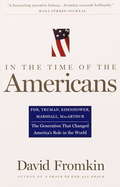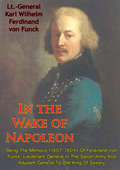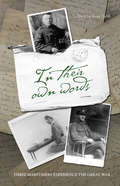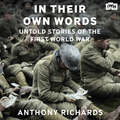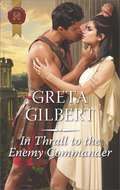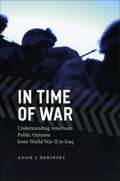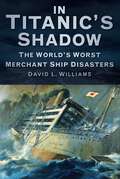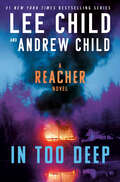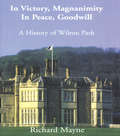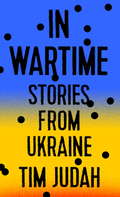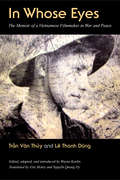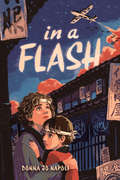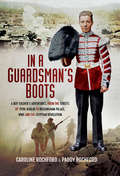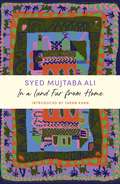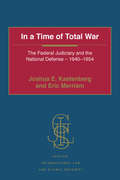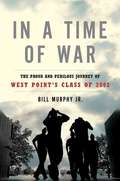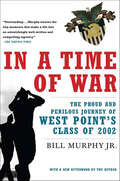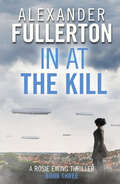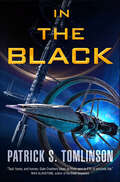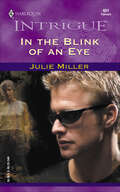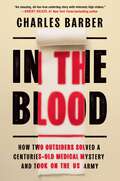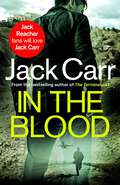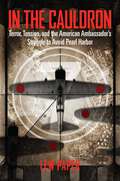- Table View
- List View
In The Time Of The Americans
by David FromkinComing of age during World War I and attaining their finest hour in World War II and the Cold War, these men -- FDR, Truman, Eisenhower, Marshall, MacArthur -- transformed America from an isolated frontier nation into a global superpower. As he tells their stories, Fromkin, author of A Peace to End All Peace, shows how this generation not only made America great but largely succeeded in making it a force for good.
In The Wake Of Napoleon, Being The Memoirs (1807-1809) Of Ferdinand Von Funck, (1807-1809) Of Ferdinand Von Funck,: Lieutenant-General In The Saxon Army And Adjutant-General To The King Of Saxony
by Lt.-General Karl Wilhelm Ferdinand von Funck Philip Henry Oakley Williams Artur BrabantFerdinard von Funck (1761-1828) was born into sleepy Saxony, securely moored in a backwater of the eighteenth century, during the long reign of Frederick Augustus, the world forgetting it and only anxious to be by the world forgot. Even the ferment of the French Revolution had hardly ruffled its stagnant calm. Into this idyll of the eighteenth century burst Napoleon in full career with the methods of the nineteenth century in a hurry--as the progress of some high-powered modern tug in midstream leaves the heavy craft, moored against the bank, swaying and creaking waterlogged in its wash. By this time von Funck was a senior general in the newly re-organized Saxon army and Adjutant-general to Frederick Augustus, who had recently been raised to the dignity of a king for throwing his lot in with Napoleon. A very astute and balanced witness, the author has left a snapshot of Napoleon and his empire building at its apogee.As the title of the memoirs suggests, the record that General von Funck has left to posterity is that of the new Kingdom of Saxony, as he and his people struggled to come to terms with the full ramifications of being allied to Napoleon. Filled with anecdotes of the new King, his court, Napoleon and his senior ministers, the pages are a witty and full of interest. The memoirs were considered to be so explosive that they were not even published in Germany until 1928 with an English translation produced soon afterward.
In Their Own Words: Three Maritimers Experience the Great War
by Ross HebbA historian examines the letters written by three residents of Canada&’s Maritime provinces during their service in World War I. What was the First World War really like for Maritimers overseas? This epistolary book, edited by historian Ross Hebb, contains the letters home of three Maritimers with distinct wartime experiences: a front-line soldier from Nova Scotia, a nurse from New Brunswick, and a conscripted fisherman from Prince Edward Island. Up until now, these complete sets of handwritten letters have remained with the families who agreed to share them in time for the one-hundredth anniversary of the Great War&’s end in 2018. These letters not only give insight into the war, but also provide greater understanding of life in rural Maritime communities in the early 1900s. In Their Own Words includes a learned introduction and background information on letter writers Eugene A. Poole, Sister Pauline Balloch, and Harry Heckbert, enabling readers to appreciate the context of these letters and their importance. A welcome companion to Hebb&’s earlier book, Letters Home: Maritimers and the Great War; 1914–1918.
In Their Own Words: Untold Stories of the First World War
by Anthony RichardsThe First World War was the defining event of the last century. It claimed the lives of over 16 million people across the globe and had an enormous impact on all who experienced it. No nation in Europe was left untouched, and even neutral states felt its devastating impact. Yet it was the ordinary men and women who were affected the most. This gripping, revealing and poignant collection of stories tells the First World War from the perspective of those who were there, using letters, diaries and memoirs from Imperial War Museum's unparalleled archives.(P)2020 Headline Publishing Group Ltd
In Thrall to the Enemy Commander: In The Sheriff's Protection In Thrall To The Enemy Commander Captain Amberton's Inherited Bride (Mills And Boon Historical Ser.)
by Greta GilbertCleopatra’s slave girland an enemy Roman soldier…Egyptian slave Wen-Nefer is wary of all men. But she can’t help but be captivated by handsome Titus, adviser to Julius Caesar, even though he is commanding and intolerant of bold women like her. Their affair is as all-consuming as it is forbidden. But is he a man who will go to any lengths to love her despite their boundaries…or a sworn enemy she must never trust?“Gilbert’s passion for ancient history imbues her tales with authenticity [and] immerses readers in a long-lost culture.” — RT Book Reviews on The Spaniard’s Innocent Maiden“Gilbert’s desert romance is a tale to prize … Definitely a must.” — RT Book Reviews on Enslaved by the Desert Trader
In Time of War: Understanding American Public Opinion from World War II to Iraq
by Adam J. BerinskyFrom World War II to the war in Iraq, periods of international conflict seem like unique moments in U. S. political history--but when it comes to public opinion, they are not. To make this groundbreaking revelation, In Time of War explodes conventional wisdom about American reactions to World War II, as well as the more recent conflicts in Korea, Vietnam, the Gulf, Afghanistan, and Iraq. Adam Berinsky argues that public response to these crises has been shaped less by their defining characteristics--such as what they cost in lives and resources--than by the same political interests and group affiliations that influence our ideas about domestic issues. With the help of World War II-era survey data that had gone virtually untouched for the past sixty years, Berinsky begins by disproving the myth of "the good war" that Americans all fell in line to support after the Japanese bombed Pearl Harbor. The attack, he reveals, did not significantly alter public opinion but merely punctuated interventionist sentiment that had already risen in response to the ways that political leaders at home had framed the fighting abroad. Weaving his findings into the first general theory of the factors that shape American wartime opinion, Berinsky also sheds new light on our reactions to other crises. He shows, for example, that our attitudes toward restricted civil liberties during Vietnam and after 9/11 stemmed from the same kinds of judgments we make during times of peace. With Iraq and Afghanistan now competing for attention with urgent issues within the United States,In Time of War offers a timely reminder of the full extent to which foreign and domestic politics profoundly influence--and ultimately illuminate--each other.
In Titanic's Shadow: The World's Worst Merchant Ship Disasters
by David L. WilliamsWhile the near 1,500 victims of Titanic accounted for a huge loss of life, each of the ships here had a greater number of casualties, in some cases more than five times as many. In total, these 27 merchant ship sinkings resulted in a staggering loss of life at sea – more than 96,000 in total, 3,840 per ship. While the circumstances were different to Titanic, the outcome in each case was no less tragic. Yet, despite the fact that Titanic ranks behind so many other losses, so powerful has her name become that it was the inevitable choice to describe some of these other events, ‘Germany’s Titanic’ and ‘The Titanic of Japan’ being two examples. Ships include the Lancastria, Britain’s worst maritime disaster with 3,000 lost; the Ryusei Maru, a Japanese ‘Hellship’ loaded with 6,000 Allied POWs, torpedoed by a US submarine; and the Wilhelm Gustloff, a German liner packed with 7,800 civilians, sunk by a Russian submarine. There were no survivors and this tragedy was the worst maritime disaster of all time.
In Too Deep: A Reacher Novel (Jack Reacher #29)
by Lee Child Andrew Child#1 NEW YORK TIMES BESTSELLER • A gripping Jack Reacher thriller from the bestselling authors Lee Child and Andrew ChildDon&’t miss the hit streaming series Reacher!Reacher had no idea where he was. No idea how he had gotten there. But someone must have brought him. And shackled him. And whoever had done those things was going to rue the day. That was for damn sure.Jack Reacher wakes up alone, in the dark, handcuffed to a makeshift bed. His right arm has suffered some major damage. His few possessions are gone. He has no memory of getting there.The last thing Reacher can recall is the car he hitched a ride in getting run off the road. The driver was killed.His captors assume Reacher was the driver&’s accomplice and patch up his wounds as they plan to make him talk.A plan that will backfire spectacularly . . .
In Victory, Magnanimity, in Peace, Goodwill: A History of Wilton Park (Whitehall Histories Ser.)
by Richard MayneWilton Park was once a secret camp for interrogating enemy generals during World War II. But it took on its true, unique role in 1946 as a training centre for German prisoners-of-war. This volume tells of its history and the extraordinary life of Heinz Koeppler, its founding father.
In Wartime: Stories from Ukraine
by Tim JudahFrom one of the finest journalists of our time comes a definitive, boots-on-the-ground dispatch from the front lines of the conflict in Ukraine. Ever since Ukraine's violent 2014 revolution, followed by Russia's annexation of Crimea, the country has been at war. Misinformation reigns, more than two million people have been displaced, and Ukrainians fight one another on a second front--the crucial war against corruption.With In Wartime, Tim Judah lays bare the events that have turned neighbors against one another and mired Europe's second-largest country in a conflict seemingly without end.In Lviv, Ukraine's western cultural capital, mothers tend the graves of sons killed on the other side of the country. On the Maidan, the square where the protests that deposed President Yanukovych began, pamphleteers, recruiters, buskers, and mascots compete for attention. In Donetsk, civilians who cheered Russia's President Putin find their hopes crushed as they realize they have been trapped in the twilight zone of a frozen conflict. Judah talks to everyone from politicians to poets, pensioners, and historians. Listening to their clashing explanations, he interweaves their stories to create a sweeping, tragic portrait of a country fighting a war of independence from Russia--twenty-five years after the collapse of the USSR.
In Whose Eyes: The Memoir of a Vietnamese Filmmaker in War and Peace
by Tran Van ThuyTrân Van Thuy is a celebrated Vietnamese filmmaker of more than twenty award-winning documentaries. A cameraman for the People’s Army of Vietnam during the Vietnam War, he went on to achieve international fame as the director of films that address the human costs of the war and its aftermath. Thuy’s memoir, when published in Vietnam in 2013, immediately sold out. In this translation, English-language readers are now able to learn in rich detail about the life and work of this preeminent artist. Written in a gentle and charming style, the memoir is filled with reflections on war, peace, history, freedom of expression, and filmmaking. Thuy also offers a firsthand account of the war in Vietnam and its aftermath from a Vietnamese perspective, adding a dimension rarely encountered in English-language literature.
In a Flash
by Donna Jo NapoliA riveting and dramatic story of two devoted sisters, Italian citizens, who must survive in WWII Japan.In 1940, when Simona is eight and her sister, Carolina, is five, their father becomes the cook to the Italian ambassador to Japan, and the family leaves Italy for Tokyo. The girls learn perfect Japanese, make friends, and begin to love life in their new home. But soon Japan is engaged in a world war. In 1943, when all Italians in Japan are confined to internment camps as enemy aliens, Papà and the girls are forced to part, and Simona and Carolina embark on a dramatic journey. Anyone who aids them could be arrested for treason. All the sisters have is each other: their wits, courage, and resilience, and the hope that they will find people who see them not as the enemy, but simply as children trying to survive. In this gripping, deeply moving story, Donna Jo Napoli gives readers an unforgettable and authentic new perspective on World War II.
In a Guardsmans Boots: A Boy Soldiers Adventures from the Streets of 1920s Dublin to Buckingham Palace, WWII and the Egyptian Revolution
by Caroline Rochford Paddy RochfordWhen he was just eight years old, Paddy Rochford enrolled at Dublins Royal Hibernian Military School, where he was taught how to be a soldier with the British Army, like his father. Soon afterwards, in 1922, he and his fellow pupils were evacuated from Ireland, a land torn apart by civil war. Across the sea in England, Paddy joined the Third Battalion of the Coldstream Guards as a drummer boy, with postings to Windsor Castle, Buckingham Palace, the Bank of England and the Tower of London, where he guarded the Royal Family and Britains treasures. In the 1930s, as thousands of Jewish families fled Nazi Germany, Paddy was sent to Jerusalem, charged with keeping the peace between the local Arabs and the Jewish immigrants. During the Second World War, he was part of the Western Desert Campaign in Egypt, defending British territories. After countless wartime adventures, the young sergeant went on to train the Egyptian Army, where a bond of friendship grew between him and the future president, Colonel Nasser. Learning Nassers plans to oust the British from Egypt, Paddy tried in vain to warn his superiors prior to the bloody revolution of 1952, which signalled the end of British supremacy in the Middle East. Paddy retired from the army soon afterwards, moving his young family to Yorkshire, where he began writing these, his enthralling memoirs about a young boy who spent a lifetime growing into his boots.
In a Land Far from Home: a JM Journey
by Syed Mujtaba AliWITH A NEW INTRODUCTION BY TARAN KHAN, author of Shadow CityTRANSLATED FROM BENGALI BY NAZES AFROZAn intrepid traveller and true cosmopolitan, legendary Bengali writer Syed Mujtaba Ali spent a year and a half teaching in Kabul from 1927 to 1929. Curious to explore Afghan society, Mujtaba Ali had access to a cross-section of Kabul's population, and in In a Land Far from Home he chronicles his experiences with a keen eye and a wicked sense of humour.Mujtaba Ali's travels coincided with a critical point in Afghanistan's history: when the reformist King Amanullah tried to steer his country towards modernity by encouraging education for girls and giving them the choice of removing the burqa. Branded a 'kafir', Amanullah was overthrown by the bandit leader Bacha-e-Saqao. With striking parallels to twenty-first century events in the region, In a Land Far From Home is the only first-hand account of this tumultuous period by a non-Afghan.Providing a unique perspective, Mujtaba Ali's fascinating account is brought to life by contact with a colourful cast of characters at all levels of society -- from the garrulous Pathan Dost Muhammed and the gentle Russian giant Bolshov, to his servant, Abdur Rahman and his partner in tennis, the Crown Prince Enayatullah.
In a Time of Total War: The Federal Judiciary and the National Defense - 1940-1954 (Justice, International Law and Global Security)
by Joshua E. Kastenberg Eric MerriamThis book is a judicial, military and political history of the period 1941 to 1954. As such, it is also a United States legal history of both World War II and the early Cold War. Civil liberties, mass conscription, expanded military jurisdiction, property rights, labor relations, and war crimes arising from the conflict were all issues to come before the federal judiciary during this period and well beyond since the Supreme Court and the lower courts heard appeals from the government’s wartime decisions well into the 1970s. A detailed study of the judiciary during World War II evidences that while the majority of the justices and judges determined appeals partly on the basis of enabling a large, disciplined, and reliable military to either deter or fight a third world war, there was a recognition of the existence of a tension between civil rights and liberties on the one side and military necessity on the other. While the majority of the judiciary tilted toward national security and deference to the military establishment, the judiciary’s recognition of this tension created a foundation for persons to challenge governmental narrowing of civil and individual rights after 1954. Kastenberg and Merriam present a clearer picture as to why the Court and the lower courts determined the issues before them in terms of external influences from both national and world-wide events. This book is also a study of civil-military relations in wartime so whilst legal scholars will find this study captivating, so will military and political historians, as well as political scientists and national security policy makers.
In a Time of War: The Proud and Perilous Journey of West Point's Class of 2002
by Bill Murphy Jr.The dramatic story of West Point's class of 2002, the first in a generation to graduate during wartime. They came to West Point in a time of peace, but soon after the start of their senior year, their lives were transformed by September 11. The following June, when President George W. Bush spoke at their commencement and declared that America would 'take the battle to the enemy,' the men and women in the class of 2002 understood that they would be fighting on the front lines. In this stirring account of the five years following their graduation from West Point, the class experiences firsthand both the rewards and the costs of leading soldiers in the war on terror. In a Time of War focuses on two members of the class of 2002 in particular: Todd Bryant, an amiable, funny Californian for whom military service was a family tradition; and Drew Sloan, the hardworking son of liberal parents from Arkansas who is determined to serve his country. On the battlefields of Iraq and Afghanistan, Todd, Drew, and their classmates--the army's newest and youngest officers--lead their troops into harm's way again and again. Meticulously reported, sweeping in scope, Bill Murphy Jr.'s powerful book follows these brave and idealistic officers--and their families--as they experience the harrowing reality of the modern battlefield. In a Time of War tells a vivid and sometimes heartbreaking story about courage, honor, and what war really means to the soldiers whose lives it defines.
In a Time of War: The Proud and Perilous Journey of West Point's Class of 2002
by Bill Murphy Jr.The dramatic story of West Point's class of 2002, the first in a generation to graduate during wartimeThey came to West Point in a time of peace, but soon after the start of their senior year, their lives were transformed by September 11. The following June, when President George W. Bush spoke at their commencement and declared that America would "take the battle to the enemy," the men and women in the class of 2002 understood that they would be fighting on the front lines. In this stirring account of the five years following their graduation from West Point, the class experiences firsthand both the rewards and the costs of leading soldiers in the war on terror. In a Time of War focuses on two members of the class of 2002 in particular: Todd Bryant, an amiable, funny Californian for whom military service was a family tradition; and Drew Sloan, the hardworking son of liberal parents from Arkansas who is determined to serve his country. On the battlefields of Iraq and Afghanistan, Todd, Drew, and their classmates—the army's newest and youngest officers—lead their troops into harm's way again and again. Meticulously reported, sweeping in scope, Bill Murphy Jr.'s powerful book follows these brave and idealistic officers—and their families—as they experience the harrowing reality of the modern battlefield. In a Time of War tells a vivid and sometimes heartbreaking story about courage, honor, and what war really means to the soldiers whose lives it defines.
In at the Kill (Rosie Ewing Spy Thrillers)
by Alexander FullertonShe operates in the enemy&’s midst—but the true danger is from one of her own . . . A pulse-pounding WWII thriller by an author whose &“action passages are superb&” (The Observer). At the London headquarters of &‘F&’ Section SOE—Special Operations Executive—they&’re sure Rosie Ewing is dead, shot by the Gestapo while running from a train taking her to Ravensbrück concentration camp. But they shouldn&’t be so sure. Left for dead, Rosie has been nursed back to health at a farmhouse in Alsace. Now she has a score to settle, and an SOE traitor to track down. It&’s not just necessary, it&’s personal—because she&’s one of the agents he betrayed . . .Praise for the Rosie Ewing Spy Thrillers: &“Enthralling . . . A gripping read.&” —Historical Novels Review &“The most meticulously researched war novels I&’ve ever read.&” —Len Deighton
In the Black
by Patrick S. Tomlinson“Tomlinson offers space opera fans much to chew on in this fun, fast-moving series debut . . . Readers are sure to be entertained.” —Publishers WeeklyIt’s The Hunt for Red October in space, with this brand new military science fiction novel from Patrick S. Tomlinson.In a demilitarized zone on the border of human space, long range spy satellites are mysteriously going quiet, and no one knows why. Captain Susan Kamala and her crew are dispatched to figure out what’s going on and solve the problem.That problem, however, is a mysterious, bleeding edge alien ship that no human vessel could hope to match in open conflict. But, it’s not spoiling for a fight.Now, the Captain and her crew must figure out how to navigate a complicated game of diplomacy, balancing the needs of their corporate overlords, and the honest desire for a lasting peace between the two races, all without letting a long-standing cold war turn hot.“Tomlinson is back with another crowd-pleasing, snarky, thought-provoking, character-driven tale.” —Booklist
In the Blink of Eye (The Taylor Clan #2)
by Julie MillerThe mysterious explosion at the crime lab had cost one man his life, and had pitched Mac Taylor into perpetual darkness. Now, as the evidence mounted against the temporarily dismissed forensic expert, one person had dedicated herself to proving his innocence: the former girl-next-door, Julia Dalton. Before long, Mac's predicament had them racing against time and running for their lives, a life Mac could no longer imagine without the experienced nurse by his side. Suddenly Mac was seeing more with his heart than he ever had with his eyes....
In the Blood
by June OldhamRigby's grandfather, Gilbert, has wandered from home and is roaming the Yorkshire countryside in distress. Finding an old map in his grandfather's home, peculiarly annotated and marked by his grandfather, Rigby begins to realise that it duplicates Normandy: the marked sites mirror places in another place and other time - the days following the Normandy landings in 1944. He is drawn down an elusive trail into the past, hunting old memories and new truths to the heart of his grandfather's youth in the raw days of the War. It shakes the very foundations of Rigby's own young life, and as he discovers the secret about another soldier - the quest becomes an inner journey for Rigby. He learns of the feelings of young men caught in the terrors and misery of the battlefield, and the impact of their lives on generations to come.
In the Blood: How Two Outsiders Solved a Centuries-Old Medical Mystery and Took On the US Army
by Charles BarberThe "high-stakes" true story of how an absent-minded inventor and a down-on-his-luck salesman joined forces to create a once‑in‑a‑generation lifesaving product: "Suspenseful storytelling helps us see and feel the struggle and frustration, the sweat and tears . . . Inspiring&” (Robert Kolker, #1 New York Times bestselling author of Hidden Valley Road). At the 1993 Battle of Mogadishu, dramatized by the popular film Black Hawk Down, the majority of soldiers who died were killed instantly or bled to death before they could reach an operating table. This tragedy reinforced the need for a revolutionary treatment that could transform trauma medicine. So, when Frank Hursey and Bart Gullong—who had no medical or military experience—discovered that a cheap, crushed rock called zeolite had blood‑clotting properties, they brought it to the military's attention. The Marines and the Navy adopted the resulting product, QuikClot, immediately. The Army, however, resisted. It had two products of its own being developed to prevent excessive bleeds, one of which had already cost tens of millions of dollars. The other, "Factor Seven," had a more dangerous complication: its side effects could be deadly. Unwilling to let its efforts end in failure—and led by the highly influential surgeon Colonel John Holcomb—the Army set out to smear QuikClot&’s reputation. Over the course of six years, Hursey and Gullong engaged in an epic struggle with Holcomb for recognition. Ultimately, a whistle‑blower inside the Army challenged the Army&’s embrace of Factor Seven, which resulted in a massive lawsuit led by the U.S. Department of Justice. The lawsuit focused further attention on the financial ties between the pharmaceutical company that produced Factor Seven and Holcomb&’s research institute. By withholding QuikClot—which later became the medical miracle of the Iraq War—and in the use of Factor Seven with its known, life-threatening risks of heart attacks and strokes, the lives of countless soldiers were imperiled. Using deep reportage and riveting prose, In the Blood recounts this little‑known David‑and‑Goliath story of corruption, greed, and power within the military—and the devastating consequences of unchecked institutional arrogance.
In the Blood: James Reece 5 (Terminal List Ser. #5)
by Jack Carr**NOW AN AMAZON PRIME TV SERIES STARRING CHRIS PRATT**'Take my word for it, James Reece is one rowdy motherf***er. Get ready!' CHRIS PRATT A woman boards a plan in Burkina Faso having just completed a targeted assassination for the state of Israel. Two minutes after takeoff her plane is blown out of the sky. 6000 miles to the east, James Reece watches the names and pictures of the victims cross cable news. One face triggers a distant memory of a Mossad operative attached to the CIA years earlier in Iraq, a woman with ties to the intelligence services of two nations, a woman Reece thought he would never see again… In a global pursuit spanning four continents, James Reece will enlist the help of friends new and old to track down her killer and walk right into a trap set by a master sniper, a sniper who has enlisted help of his own…The 5th in the bestselling James Reece series, from former Navy SEAL Jack Carr. If you loved Lee Child's Jack Reacher, Peter James's Roy Grace or Michael Connelly's Mickey Haller, you will love James Reece! Praise for Jack Carr: &‘A propulsive and compulsive series. Jack Carr&’s James Reece is the kind of guy you&’d want to have in your corner. A suspenseful and exhilarating thrill-ride. Jack Carr is the real deal&’ Andy McNab 'This is seriously good . . . the suspense is unrelenting, and the tradecraft is so authentic the government will probably ban it – so read it while you can!' Lee Child 'With a particular line in authentic tradecraft, this fabulously unrelenting thrill-ride was a struggle to put down' Mark Dawson 'Gritty, raw and brilliant!' Tom Marcus &‘So powerful, so pulse-pounding, so well-written – rarely do you read a debut novel this damn good&’ Brad Thor 'Carr writes both from the gut and a seemingly infinite reservoir of knowledge in the methods of human combat. Loved it!' Chris Hauty 'A powerful, thoughtful, realistic, at times terrifying thriller that I could not put down. A terrific addition to the genre, Jack Carr and his alter-ego protagonist, James Reece, continue to blow me away' Mark Greaney 'Thrilling' Publishers Weekly
In the Blood: James Reece 5 (Terminal List Ser. #5)
by Jack Carr**NOW AN AMAZON PRIME TV SERIES STARRING CHRIS PRATT**'Take my word for it, James Reece is one rowdy motherf***er. Get ready!' CHRIS PRATT A woman boards a plan in Burkina Faso having just completed a targeted assassination for the state of Israel. Two minutes after takeoff her plane is blown out of the sky. 6000 miles to the east, James Reece watches the names and pictures of the victims cross cable news. One face triggers a distant memory of a Mossad operative attached to the CIA years earlier in Iraq, a woman with ties to the intelligence services of two nations, a woman Reece thought he would never see again… In a global pursuit spanning four continents, James Reece will enlist the help of friends new and old to track down her killer and walk right into a trap set by a master sniper, a sniper who has enlisted help of his own…The 5th in the bestselling James Reece series, from former Navy SEAL Jack Carr. If you loved Lee Child's Jack Reacher, Peter James's Roy Grace or Michael Connelly's Mickey Haller, you will love James Reece! Praise for Jack Carr: &‘A propulsive and compulsive series. Jack Carr&’s James Reece is the kind of guy you&’d want to have in your corner. A suspenseful and exhilarating thrill-ride. Jack Carr is the real deal&’ Andy McNab 'This is seriously good . . . the suspense is unrelenting, and the tradecraft is so authentic the government will probably ban it – so read it while you can!' Lee Child 'With a particular line in authentic tradecraft, this fabulously unrelenting thrill-ride was a struggle to put down' Mark Dawson 'Gritty, raw and brilliant!' Tom Marcus &‘So powerful, so pulse-pounding, so well-written – rarely do you read a debut novel this damn good&’ Brad Thor 'Carr writes both from the gut and a seemingly infinite reservoir of knowledge in the methods of human combat. Loved it!' Chris Hauty 'A powerful, thoughtful, realistic, at times terrifying thriller that I could not put down. A terrific addition to the genre, Jack Carr and his alter-ego protagonist, James Reece, continue to blow me away' Mark Greaney 'Thrilling' Publishers Weekly
In the Cauldron: Terror, Tension, and the American Ambassador's Struggle to Avoid Pearl
by Lew PaperThis is not just another book about Pearl Harbor. It is the story of Joseph Grew, America&’s ambassador to Japan, and his frantic effort in the months before the Pearl Harbor attack to orchestrate an agreement between Japan and the United States to avoid the war he saw coming. It is a story filled with hope and heartache, with complex and fascinating characters, and with a drama befitting the momentous decisions at stake. And more than that, it is a story that has never been told. In those months before the Pearl Harbor attack, Japan and the United States were locked in a battle of wills. President Franklin D. Roosevelt's economic sanctions were crippling Japan. America's noose was tightening around Japan's neck — but the country's leaders refused to yield to American demands. In this cauldron of boiling tensions, Joseph Grew offered many recommendations to break the deadlock. Having resided and worked in Tokyo for almost ten years, Grew understood what Roosevelt and his administration back home did not: that the Japanese would rather face annihilation than endure the humiliation of surrendering to American pressure. The President and his administration saw little need to accept their ambassador&’s recommendations. The administration&’s policies, they believed, were sure to succeed. And so, with increasing urgency, Grew tried to explain to the President and his administration that Japan&’s mindset could not be gauged by Western standards of logic and that the administration&’s policies could lead Japan to embark on a suicidal war with the United States &“with dangerous and dramatic suddenness.&” Relying on Grew&’s diaries, letters and memos, interviews with members of the families of Grew and his staff, and an abundance of other primary source materials, Lew Paper presents the gripping story of Grew&’s effort to halt the downward spiral of Japan&’s relations with the United States. Grew had to wrestle with an American government that would not listen to him – and simultaneously confront an increasingly hostile environment in Japan, where pervasive surveillance, arbitrary arrest, and even unspeakable torture by Japan's secret police were constant threats. In the Cauldron reads like a novel, but it is based on fact. And it is sure to raise questions whether the Pearl Harbor attack could have been avoided.
